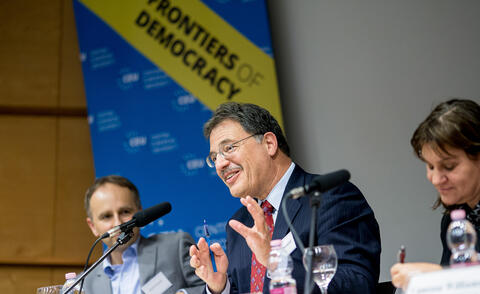FSI Courses

FSI Courses
Student Programs builds on our FSI faculty-taught courses by engaging students beyond the classroom as they work in the field or in the lab with researchers and fellows.
I became particularly interested in nuclear policy after doing research for Professor Hecker and taking classes from him and others that addressed nuclear weapons.
Gabby Levikow '18
History major, Political Science minor, 2018 CISAC honors student
FSI Faculty Courses Offered
Featured Courses
Managing Global Political Risk
POLECON 584, Amy Zegart
This course examines the full array of political risks confronting businesses today, from creeping expropriations to sudden shocks like national debt defaults and coups to emerging threats like cyber exploitation. Students will learn about impediments to assessing political risk and how to tackle them, develop strategies for managing political risk in a systematic way, and craft tools for mitigating the downside effects of political risk to business.
Read More about Managing Global Political Risk
Foreign Policy Decision Making in Comparative Perspective
POLISCI 242, Michael McFaul
This seminar will examine how countries and multilateral organizations make decisions about foreign and international policy. The hypothesis to be explored in the course is that individuals, bureaucracies, and interest groups shape foreign policy decisions. That hypothesis will be tested against other more structural explanations of how countries behave in the international system. After a brief review of the academic literature in the first part of the course, the seminar will focus on several cases studies of foreign policy decision-making by the United States, China, Russia, Iran, and North Korea, as well as the United Nations and NATO. This seminar is intended for masters students and fourth-year undergraduates.
Read More about Foreign Policy Decision Making in Comparative Perspective
The Spirit of Democracy
THINK 51, Larry Diamond
This course provides an overview of the challenges and aspirations facing ideals of democracy. It deals both with competing visions of what democracy might be, and their actual realization not only in the US but around the world. It will begin with the debate over the American founding and move eventually to the third wave of democratization around the world in the late 20th century as well as its more recent retrenchment.
Read More about The Spirit of Democracy



